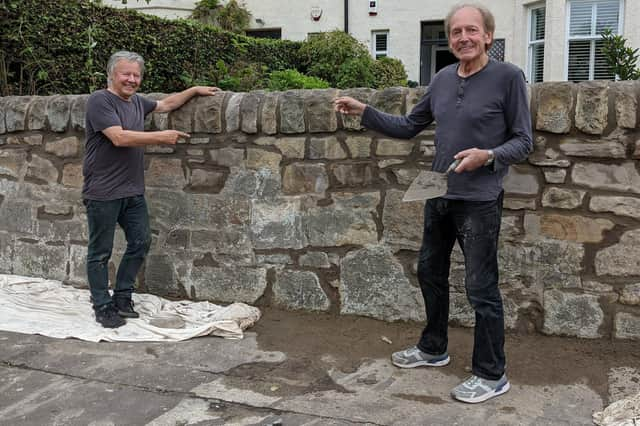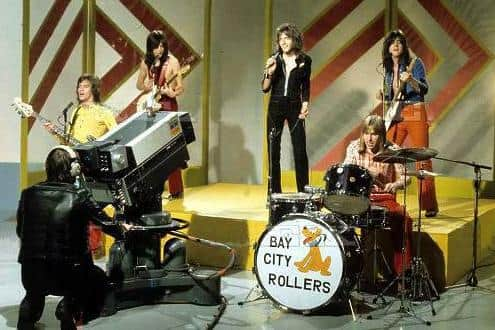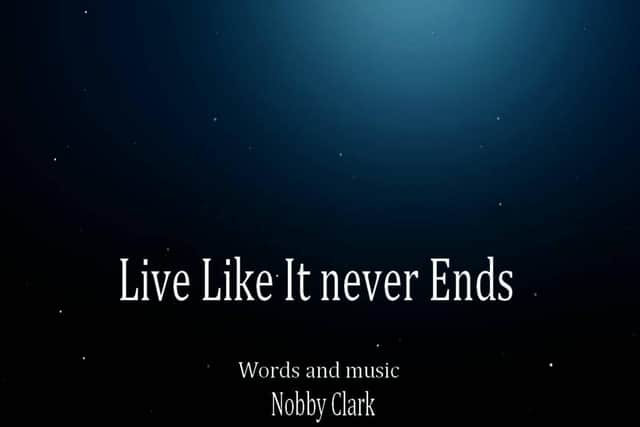Bay City Rollers reunite – to rebuild an Edinburgh garden wall


Let us know what you think and join the conversation at the bottom of this article
Fast approaching his 71st birthday on September, 10, the singer, who until lockdown could regularly be found jamming with friends at Bannerman's on the Cowgate, has been keeping busy over the last 18 months, the new song being just one of a number he has penned. He's upbeat as we chat and he reveals the origins of the track.
"It was inspired by a girl I've known for some time, although I haven't seen her recently. She was one of those people that just loved everyone and talked about dream catchers, the stars and the energy that comes from everything around us. Then she got cancer and fought her way through that by thinking of others. It just struck me that some people in life just don't appreciate what they have."


Advertisement
Hide AdAdvertisement
Hide AdHe continues, "In my own life, I've gone through some pretty horrible times and now try to replace the negative side of my life, which was all to do with alcoholism, with something positive. I've not had a drink in more than 20 years because it nearly destroyed me, and turned my life around by working hard at keeping a positive outlook ever since.
"The power of now is very important to me and that really is what the song is about, about approaching everything with positivity instead of finding fault."
Clark is very aware too that not everybody is capable of coming back from some of the dark places alcohol took him, it's something he says he has thought a lot about.
"One of the things that holds people back is being caught up in the world of material possessions. The word I use a lot is spiritual, and that has no connection to the religious teachings I was brought up; I am an atheist but do believe in a higher power, just not the one forced upon me as a child.


Advertisement
Hide AdAdvertisement
Hide Ad"My idea of a higher power is something greater than myself, so spiritual is compassion, love, all these things that are not material. You have to allow them into your life otherwise you can't see the good in other people. That's what changed things around for me, before I was always looking at people with suspicion."
That's perhaps unsurprising when you consider the history of the Rollers and their well-publicised battles with disgraced manager Tam Paton and record companies. Clark himself left the band in 1974, just before Rollermania hit and a decade after he joined school pals Alan and Derek Longmuir and Neil Porteus in The Saxons, the band that would be renamed the Bay City Rollers a short time later.
"I talk about the Bay City Rollers in a very positive fashion and have always tried to do that but it's difficult to keep pushing away the bad side of it, which everyone has read about," he admits.
"There were pretty horrible things that happened and the way band members treated each other and myself over the years was terrible. Now, I look at it in a completely different light, however.
Advertisement
Hide AdAdvertisement
Hide Ad"I realise that when Les McKeown took my place in the band after I'd left, he was only sticking up for himself. I thought he was attacking me, but that wasn't the case. He was put in a position where he had to stand his ground. So if he said anything negative about me, it was just an attempt to reinforce his position.
"Recently, especially since Les passed away, I've looked at the whole situation and realised that he was put in a very difficult position where he had to front these songs that were already out there with my voice on them. I can see that now."
Clark provided the vocals on the original releases of the Rollers' songs like We Can Make Music, Manana, Remember (Sha-la-la) and Saturday Night, and reflects that the royalty battles over those and other songs, also damaged valued friendships.
"Alan and I were very very close, and again the band things came between us," he says. "The court case was a very difficult thing for me. Looking at it from the outside now, they were only trying to keep the band together as some kind of unit to fight the record company.
Advertisement
Hide AdAdvertisement
Hide Ad"They saw me as an outsider but what they weren't taking into consideration was that I had every right to be involved in that court case; I have proof of 26 Bay City Rollers' albums put out with my voice on them, yet they weren't interested in paying me for them.
"Someone told me lately that was an under-estimation and that there are actually many more releases, as well as Rollin' and the main albums they were throwing my voice out on compilations and greatest hits collections. With the Bay City Rollers' Anthology, all 12 tracks on the first disc were mine. So I was just trying to protect my intellectual rights."
On Live Like It Never Ends, Clark is reunited in the studio with another early Roller, David Paton. The acclaimed musician and song writer was in the band from 1969 to 1970 before quitting to form Pilot with another ex-Roller, Billy Lyall, and scoring chart hits with Magic, January and Just a Smile.
"Davy played bass on Live Like It Never Ends and on the song before that called Arran, which has been picked up by the island's newspaper and radio station," he reveals.
Advertisement
Hide AdAdvertisement
Hide AdIt wasn't just in the studio that Clark found himself working with his old pal again. A picture posted to Paton's Facebook recently showed the pair all smiles after a day spent repairing a garden wall at the bassist's home - Clark's skill as a dry stone pointer inspiring what was perhaps the most unusual Rollers' collaboration ever.
The singer laughs as he recalls, "Davy and I have never lost touch, he's my closest friend. We've always had little diversions into other things in our life, many different sidelines and quite often we just do silly things that come into our head. That was one of them. When Davy phoned me up I said, 'Right, let's get the tools out and just do it. It was the garden wall of his house and we had a great laugh. I was singing all afternoon. It was fantastic. In between times, when we had a break, we'd go into his studio and listen to some music."
During lockdown, Clark has spent a lot of time in his own home studio too.
"I've not done any live stuff at all, just writing and recording and I really do miss performing live," he says. "The thing I miss most about it is just getting up on stage with musicians I know and respect and knocking out some songs. I just love it."
Advertisement
Hide AdAdvertisement
Hide AdAll that's about to change he's pleased to announce, with a busy schedule beginning to take shape as we head to 2022.
"There has been so much revived interest in the Bay City Rollers and the history of the band, I have been working on that with various people and there are so many things hopefully going to happen in the future.
"I'll also be doing some live stuff of my own after the year. Lockdown gave me a creative window to explore. Writing songs, a book or lyrics is a very isolating thing and there have been many days where I just stare out the window allowing my brain to tick over and come up with stuff.
"It's a fascinating process, in the last few months I've had many times I've thought, 'I can't write anymore. It's just garbage that is coming out, it's time to give it up.'
Advertisement
Hide AdAdvertisement
Hide Ad"That can be soul destroying, but then all of a sudden, bang, you have this song or lyric and it's almost as if it's just been waiting for you out there in the ether."
All of which ties in nicely with the motto by which he lives his life, he says, "Never decide the outcome before the event."
Live Like It Never Ends is available to download at https://nobbyclark1.bandcamp.com
A message from the Editor:
Thank you for reading this article. We're more reliant on your support than ever as the shift in consumer habits brought about by coronavirus impacts our advertisers.
If you haven't already, please consider supporting our trusted, fact-checked journalism by taking out a digital subscription
Comment Guidelines
National World encourages reader discussion on our stories. User feedback, insights and back-and-forth exchanges add a rich layer of context to reporting. Please review our Community Guidelines before commenting.